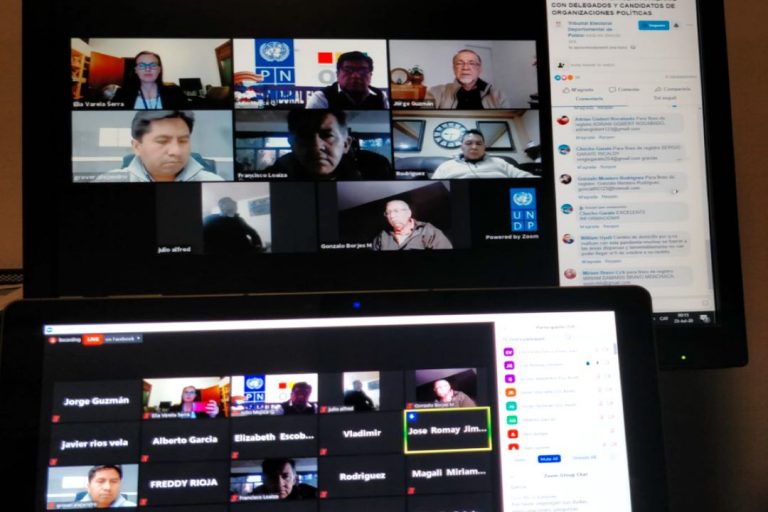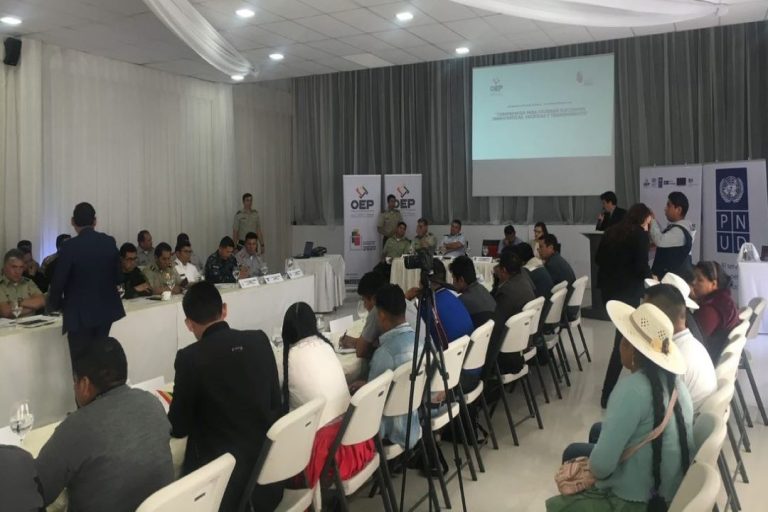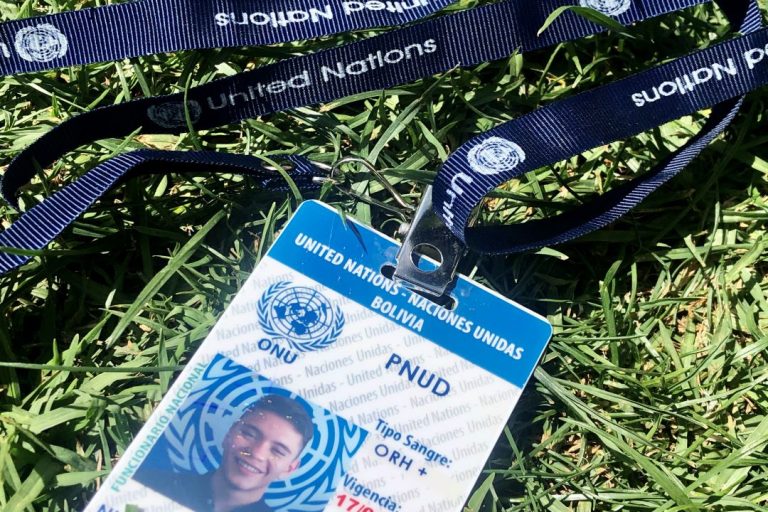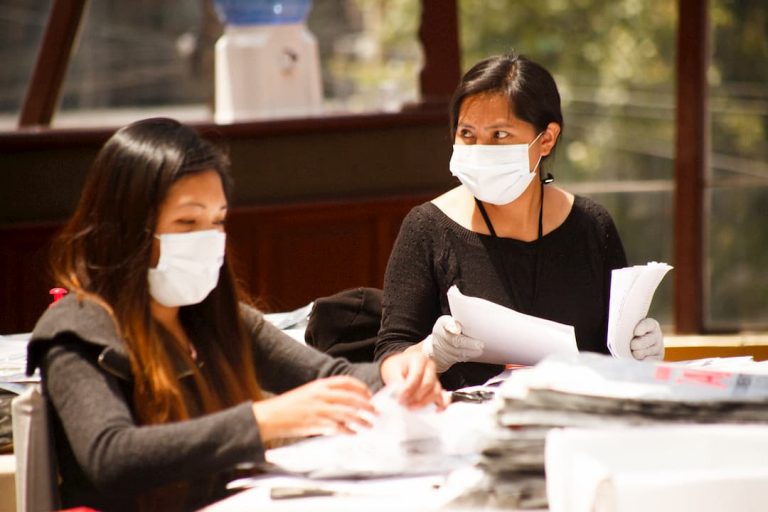Cultura de la Paz y
Fortalecimiento
del Órgano Electoral
Plurinacional (OEP) de Bolivia
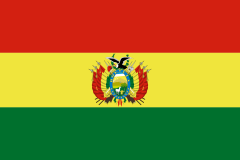
The project ” Cultura de la Paz y Fortalecimiento del Órgano Electoral Plurinacional
(OEP) de Bolivia “, carried out by the United Nations Development
Programme (UNDP), has as its main objective to support the Plurinational
Electoral Body (OEP) in the organization and execution of the electoral
processes scheduled for 2020 and 2021.
The Project, conceived towards the end of 2019, was part of the response designed by the United Nations (UN) to restore democratic values and practices in Bolivia, after the annulment of the general elections of that year and the cycle of socio-political conflicts that occurred around it.

Documentaries and short films
Documentary – 2020 General Election (EN)
Documental – Elecciones Generales Bolivia 2020 (ES)
These videos show voting procedures with biosecurity measures, motivating citizens to exercise their democratic rights.
COVID-19 updates
The spread of COVID-19 on the continent, and the planned measures to contain the virus have both constitutional and technical implications for the timing and administration of the elections in Somalia in an exceptionally complex environment. The NIEC has issued work-from-home orders to its staff. The Government has closed the country’s airspace both internally and externally. While most of Integrated Electoral Support Group’s (IESG) staff are working from home, including national staff, IESG continues to communicate internally and to provide daily technical support to NIEC staff across the broad spectrum of electoral activities, using the communications tools such as WebEx, Zoom and Microsoft teams.
The project is currently focused on the following:
• support to NIEC meetings with Joint Parliamentary Ad Hoc Committee on the Electoral Law; support NIEC to prepare its operational plan to present to the Parliament before end of May (according to the Electoral Law);
• review of NIEC Corporate Governance Framework in order to institutionalise Corporate Governance in the operations of the NIEC;
• support to NIEC to conduct public outreach activities through use of media including new media in its programming to support electoral process;
• continuation of support for construction of new NIEC compound and infrastructure;
• support to NESTF on preparing its workplan, conducting security assessment of the provisional voter registration sites in the Federal Member States (FMS) and in the Banadir Region, which will drive the preparations of the security operations budget;
• procurement of equipment and furniture for NIEC compound and NESTF operations.
Support to infrastructural development through building the Data Centre at the new NIEC compound is currently ongoing as is construction work by United Nations Assistance Mission in Somalia (UNSOM)/ United Nations Support Office in Somalia (UNSOS) on improving the security infrastructure at the compound. If the numbers affected by the pandemic increase in the country, it is likely that construction work will be halted.
Project's key figures
The Project is present in all 9 departments of Bolivia
Were invested in procurement of electoral material
Total budget handled by the Project
Electoral dialogues are held a month
2021 Subnational election's key figures
7 March 2021
Day of the elections
11 March 2021
Second round of the elections
Department
Beni
Chuquisaca
Cochachamba
La Paz
Oruro
Pando
Potosí
Santa Cruz
Tarija
Total
Registered voters
275.795
373.847
1.352.936
1.950.428
343.935
73.221
465.267
1.914.621
381.025
7.131.075
2020 General elections’ key figures
registered voters
*set as a new date for 2020 general election after the postponement due to the COVID-19 pandemic
votes cast
voter turnout
polling stations
Interviews
Luis Martinez-Betanzos, Chief Technical Advisor (spanish)
Salvador Romero, President of the Supreme Electoral Tribunal of Bolivia (spanish)
Luciana Mermet, Resident Representative UNDP Bolivia (spanish)
Susana Sottoli, Resident Coordinator, UN Bolivia (spanish)
Nataly Vargas, President of the Departamental Electoral Tribunal of Tarija (spanish)
Jörg Schreiber, Project officer, EU Delegation Bolivia (spanish)
Where we work
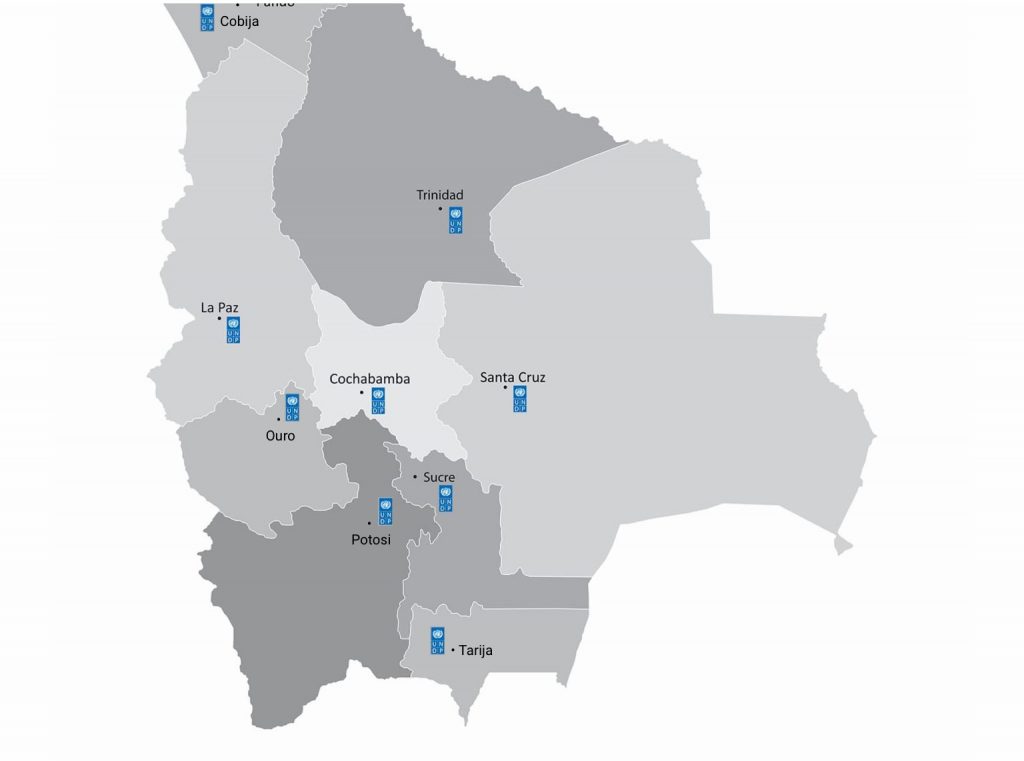
What we do
The areas in which the Project focuses are:
- Provision of technical assistance and expert advice to the OEP.
- Creation of spaces for dialogue with key actors, to reduce the possibility of electoral violence.
- Dissemination of women’s political rights and support for their full exercise.
- Acquisition of critical electoral equipment, to replace that obsolete, damaged or destroyed in 2019.
